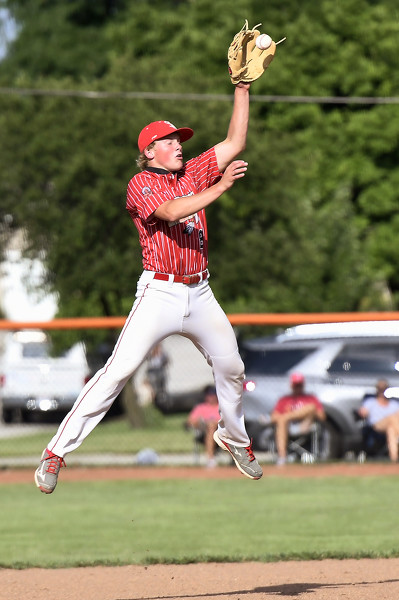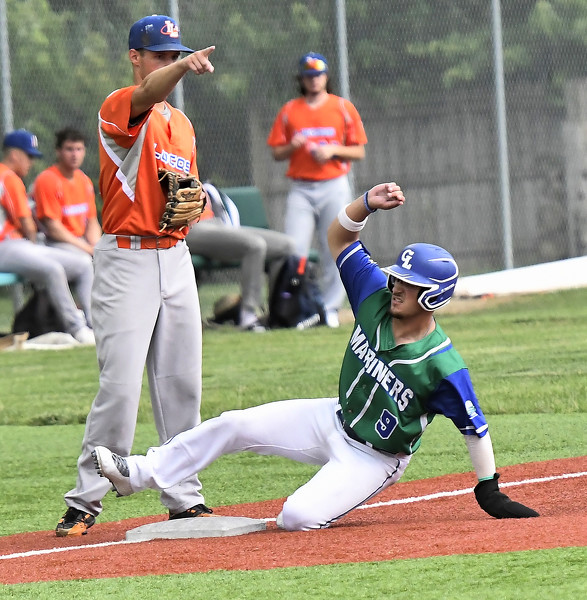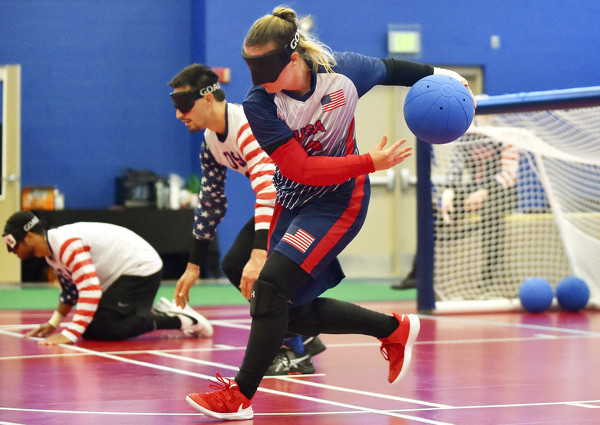
Mindy Cook trains with members of the United States Men's and Women's Goalball teams this week in Fort Wayne.
FORT WAYNE - In a span of four years, Mindy Cook has gone from learning about the game of goalball to preparing to represent her country on the highest level of competition.
Cook, a 2007 Celina High School graduate, will get that opportunity in August when she competes as a member of the United States women's goalball team at the Paralympics in Tokyo.
"I'm still pinching myself about this," said Cook during a telephone interview. "It's a dream come true and an unbelievable journey. When I first started playing, I started setting small goals for myself. Since I started later on in life, I had the goal of just getting better. I worked hard every practice with the goal of getting better every practice and every game."
The road from Celina to Tokyo has been just another challenge Cook has overcome during her life.
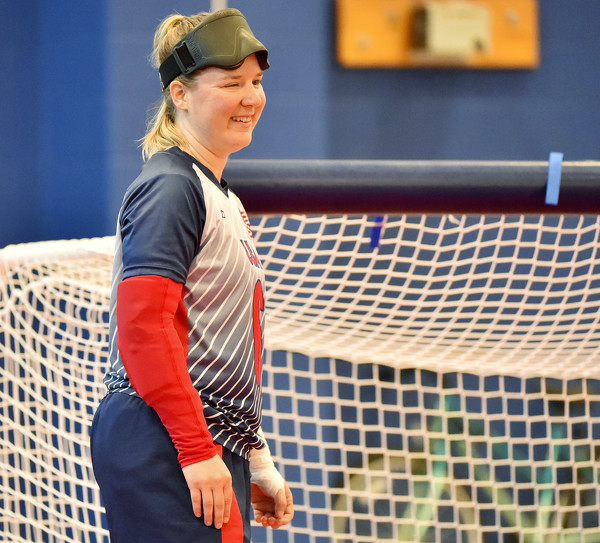
Mindy Cook, a 2007 Celina High School graduate, will travel to Tokyo as part of the United States Women's Goalball team in the paralympic games.
Cook was born with aniridia, a genetic condition where the iris of the eye does not develop. She has some vision but it is limited, and she wears glasses.
She was able to compete in sports by playing soccer in the recreation league through sixth grade and then cross country in high school, but it wasn't without difficulty.
"With soccer, I was unable to see the ball on the other side of the field," said Cook, who lives in Columbus. "In cross country, I wasn't able to follow the path on my own, so I had to follow the person in front of me."
After high school, Cook went to Ohio State University, where she earned a bachelors degree in economics and a minor in German.
Working for the United States Defense Logistics Agency in the Columbus-area town of Whitehall, Cook was invited by good friend Jim Debus to attend a goalball practice at the Ohio State School for the Blind in 2016.
"I was a little hesitant because I never heard of goalball and haven't been a part of any adapted sports," said Cook. "It was intriguing, but when I went, it looked intimidating because of these high-level athletes throwing the ball at each other."
According to the International Paralympic Committee website, the sport was created in 1946 to help vision-impaired World War II veterans in rehabilitation. To ensure a level playing field, all players - including those who are completely blind - wear an eyeshade visor. Players who have some vision may also wear eyepatches to prevent any light from being seen.
The ball, which weighs just under three pounds, contains bells that allow the players to hear the ball and judge where to move to defend. Three players from each team play on the court at a time. The court, measuring 59 feet long by 30 feet wide, has nets that span the width on both end zones. String is taped down on the court markings to allow players to know where the boundaries are.
The object is for one team to throw the ball into the opposing team's net. Defensive players may use any body part to block the ball. Teams have 10 seconds to release the ball, which must hit the floor once in their zone and once in the opposing team's zone. Games consist of 24 minutes of play split into two halves. If tournament matches are tied, two three-minute sudden-victory overtimes are played. If still tied, a shootout takes place where one player must defend the entire goal area.
"It takes all your other senses to play," said Cook. "You have to listen for the ball, feel around to know where you're at on the court instead of using your vision."
Since the game requires players to use their hearing to know where the ball is, total silence is required during play. No cheering is allowed. Coaches are not allowed to give instruction during action and can only talk to team members during timeouts.
"We say that goalball is the coolest sport you never heard of," said Cook. "I saw it as a challenge."
In 2017, Cook took part in her first goalball tournament in Michigan.
"That's where I really fell in love with the sport," she said. "I saw this community coming together with visual impairment competing in a sport they love. The atmosphere was electric. For me, it was a way for me to compete as an athlete first instead of having to adapt to a sport as an athlete with a visual impairment. … I found goalball to be empowering. It gave me confidence."
From that tournament, Cook trained to improve her game. Eventually she was able to participate in workouts at the Goalball Center of Excellence located at the Turnstone Center in Fort Wayne, Indiana. She commutes regularly from Columbus to train with with world-class players and coaches to improve her skills. At Turnstone, players work out five days a week in cycles lasting 7-10 weeks.
"I started in the sport with the idea of 'I just want to get better,'" Cook said. "It just seemed as I got into it, my teammates encouraged me to stick with it and I learned so much from them. That's what drove me to continue to practice and eventually go and practice in Fort Wayne."
In June, Cook was named to the six-player United States Women's Team, a process she called "very competitive."
"Oh gosh. I was so excited and thrilled. It's been an unbelievable experience and an incredible opportunity. I never thought I would be here. It's such an honor to represent my country."
Jake Czechowski, the coach of the United States Women's Goalball Team, is amazed how far Cook has come to reach her level of play.
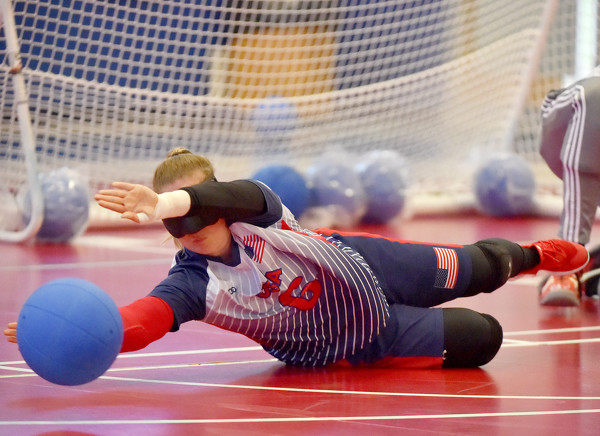
Mindy Cook trains with members of the United States Men's and Women's Goalball teams in Fort Wayne.
"The typical timeframe is typically seven to 10 years of club ball, training camp to make it to a pinnacle," said Czechowski. "Mindy has earned everything she's got. She's been given nothing. What really separates her from some of the other goalball athletes in the U.S. is her ability to balance a full-time job, transporting between here and her home, and still getting in the tremendous amount of work that we do on the court and off the court. It takes a really special person to do not just one of those things, but to balance all three. It's a tribute to her dedication and work."
Cook said her support system has been tremendous as she worked toward her goal, especially her parents Bill and Jill Cook.
"When I told them, they were so grateful and overcome with joy and celebration," said Cook, who also has a brother Lee and sister Kelsey. "They have been there through all of it. All the ups and all the downs. Theyv'e been there for the long car rides or whatever I might need. I would not have been able to do any of this without them. Same with my friends."
Cook said her coworkers also were supportive, allowing her the opportunity to train.
The United States Women's Goalball Team is very successful on the international level. Since the sport became an official event at the 1976 Paralympics, the women's team has won six medals - two each for gold, silver and bronze. Team USA were the bronze medalists at the 2016 games in Rio De Janeiro and won gold in 2008 in Beijing.
Cook's teammates Liza Czechowski, Amanda Dennis, Marybai Huking, Eliana Mason and Asya Miller have been influential in forming a bond as the team gets ready for Tokyo.
"They are veterans and their experience and mentorship has been absolutely invaluable," Cook said. "They've competed on the world's biggest stage before. They are able to share with me what to expect mentally, emotionally and physically. They've helped me immensely with all aspects of the game."
Cook called playing alongside her teammates a "privilege" and said during the past year as games were delayed due to the COVID-19 pandemic, they have grown together as a team and gotten to know one another through mental strengthening exercises.
The training has continued with Cook making the trek from Central Ohio to Fort Wayne.
"It's been a balance between the two (work and training)," said Cook, who heads to Tokyo for the Paralympics on Aug. 17 with the first matches starting Aug. 25. "I go back and forward between training (in Fort Wayne) and Columbus. We are training five days a week and on and off the court for our preparation for Tokyo. Training has been pretty grueling. We're doing as much as we can to make sure we are prepared. Our coaches (Jake Czechowski and assistant coach John Potts) have a great game plan for us to know that we will be ready."
